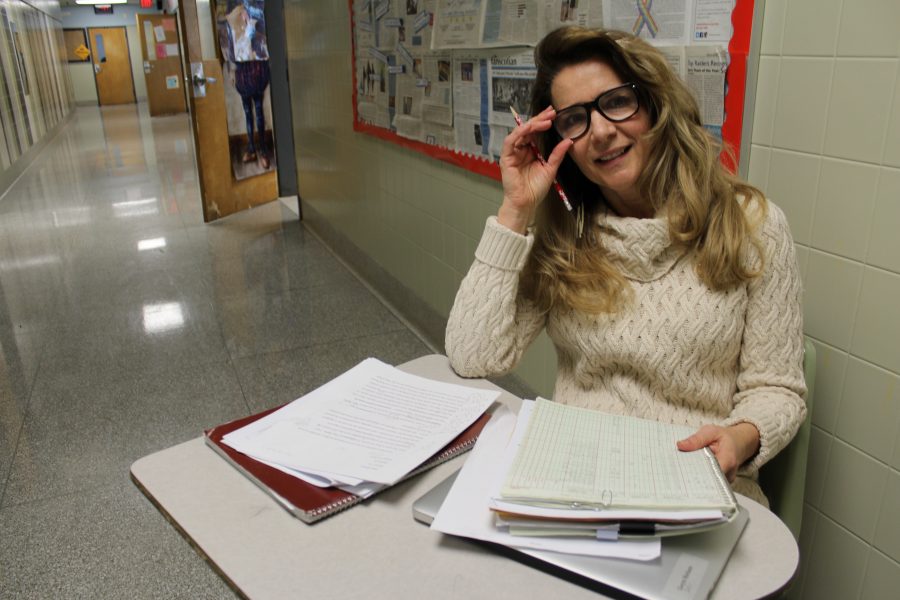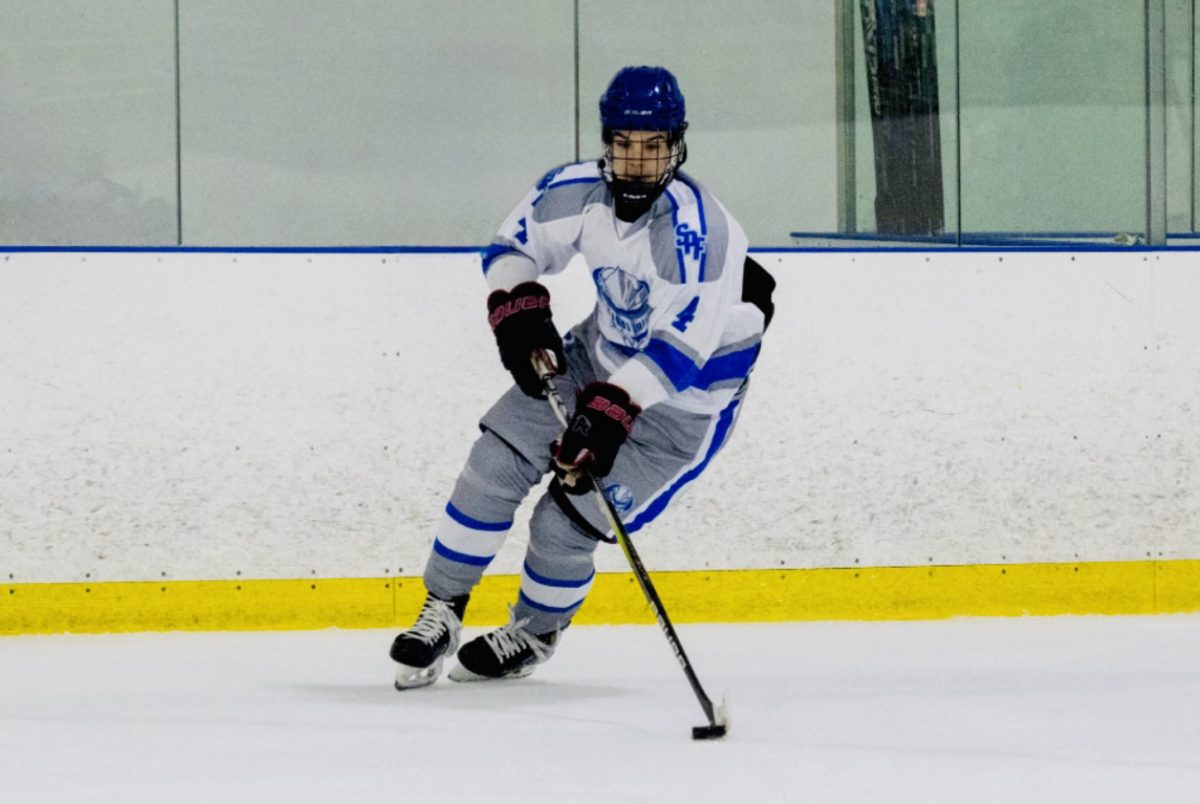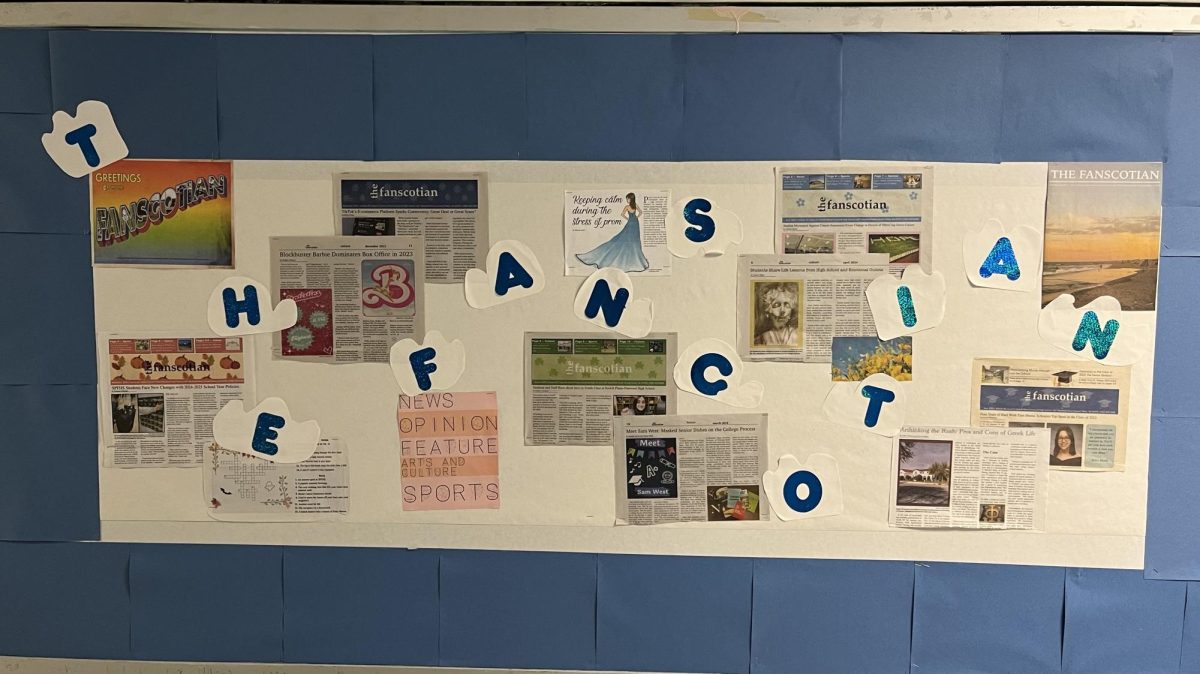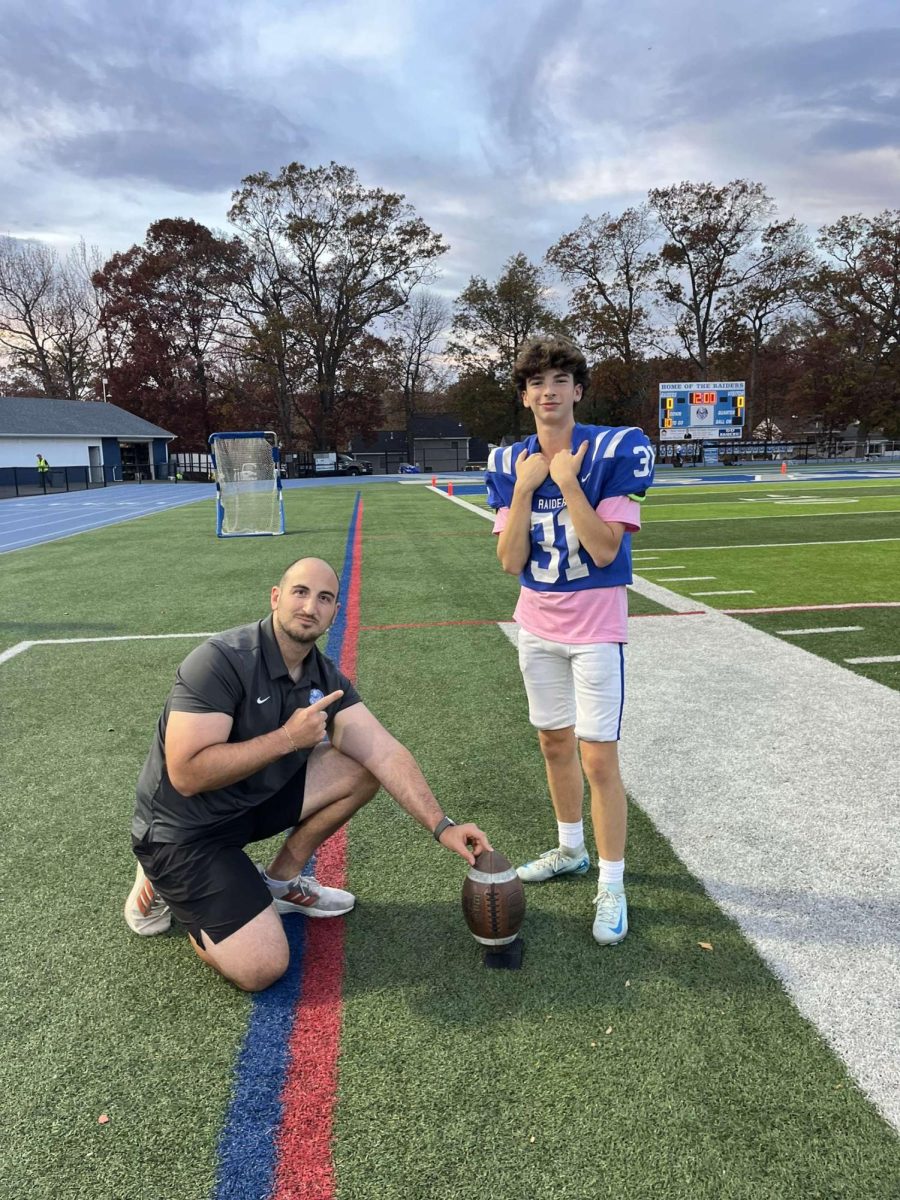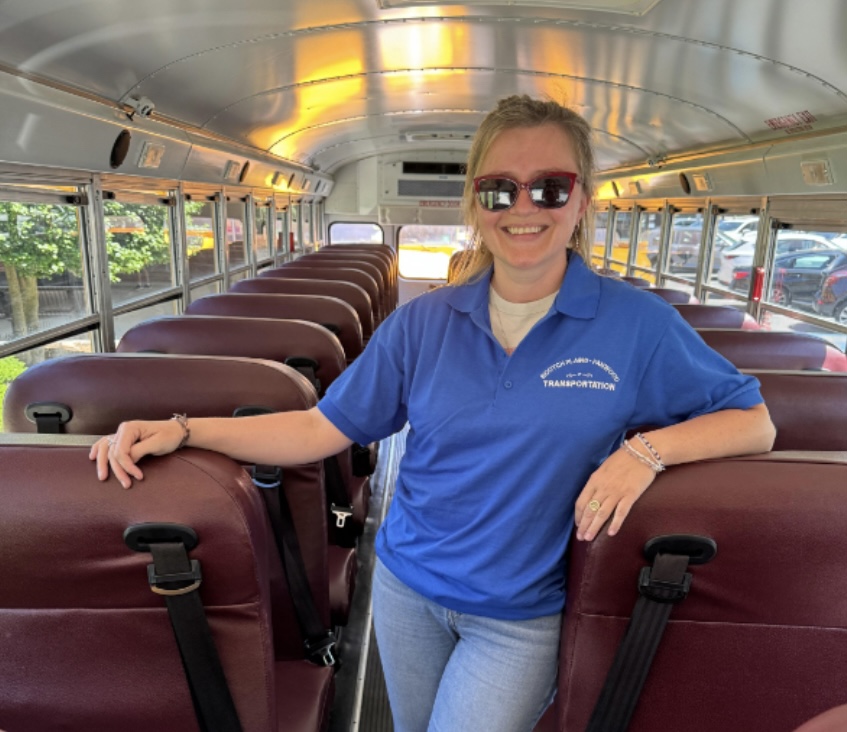Photo by Rachel Lambert
The students and teachers at Scotch Plains-Fanwood High School lead interesting lives. Humans of SPFHS enables them to share their stories. English teacher and author Gwyn Nielsen gave the Fanscotian insight into her latest novel and offered advice for students who are aspiring authors.
What is your newest book called and what is it about?
The book is called “From Footlights to Flashlights”. It’s an anthology of plays written over the course of 15 years. 15 years ago I was working for a woman in town by the name of Robin Wong. She was the president of an art studio. She hired me to teach a group of young children, but she didn’t have any plays that were suitable for them, so I wrote something for them. That became the first play, and that play is called “Hold the Phone” which is about communication in a world of advanced technology.
Each play looks at a certain theme that is relevant today. So it’s what’s known as a contemporary sort-of reinvention of a morality play. Morality plays look at what is right and wrong – examination of conscience. In today’s society, we need to refocus and look at certain attributes of ourselves that somehow run amuck. For instance, people are rude today, let’s face it; people use their cell phones, and don’t think about affecting others, so there’s one play that looks at the customers at sort of like a quick check – he’s standing on line, talking on his cell phone and disregarding everybody in the rest of the line because he’s so ingrained in the conversation. That segment is a grouping of three plays called “The Trilogy of Rude Behavior”. It’s examples of rude behavior within society, but of course, each play teaches what not to do, as opposed to what to do, so they are so-called bad examples. That is sort of comedic in a sense because there are elements of exaggeration involved. So that’s another piece. Then there’s a play that investigates identity and peer pressure. There are 10 distinct themes. Before each play there is this summary, basically, of the value of the theme that is to be explained [in the chapter].
The plays are meant to be performed as school assemblies, and four of the five I’ve already produced and directed, here in Scotch Plains. In other words, years ago, when I was teaching at Terrill, Ms. Knodel-Gordon, who has been a friend of mine since fourth grade, said, “I need you to write me a play”. Actually, when she told me that, I had already written this play about eating disorders, and she told me that Sophomores in high school study eating disorders – bulimia, anorexia – so she said, “why don’t you bring up this play and perform it as an assembly. So that was performed, I want to say, in maybe 2008 (or 2007). One of the students who graduated last year was in it, actually, as a young boy, maybe only in fifth grade. So we did that here.
The first play I directed in the district as a teacher was a play called “Rainbow Blue” which is about tolerance, and that we did at Park, with an all-star cast from Park. But we also performed it at Terrill, so like I said, some of these plays may be familiar to some students. So, yeah, I’ve been doing this for a long time.
I finally decided to put the collection together so teachers in other districts, who don’t have any money, could put on these plays for nothing. Because usually, you have to pay royalty fees, and it could be very costly. And as you know, drama departments are not used anymore or they’re limited. So I’m hoping to sort of reinvent the wheel, in a sense, so in other words, bring drama and dying art back to high school, or even to middle school.
But, it’s interesting, that I actually jump-started the program here in the district, meaning that at Terrill, I wasn’t paid to be the drama coach, but I volunteered to be the drama coach, so we would write our own pieces – the students would write their own pieces – and pretty much produce it all, so that I did for years there, and now, of course, we have the new music teacher, Mr. Thomas, who is involved in these musicals, which we never had before. See, I had to write the plays, I had to cast them, and I wasn’t paid a penny for this. But that isn’t the point because when I write it isn’t about the money. It’s about a message that has to get out there.
What made you want to write? Who are some of your writing inspirations?
Well, I have to tell you, the reason why I started writing was because my daughter, who is now 25, she graduated from here in 2009, was such a difficult child – she was so hard to please. I couldn’t just sit down and read her a picture book. She wanted me to write – “No no, Mommy, we read this before! You have to make up a story!” – and I was like, how am I going to do this, you know, come up with a new story every night for this kid. That’s how demanding she was. And the juice of this was set into motion. She was the one who stimulated my creativity as a writer. I never thought about writing before that.
It’s interesting because all of my books were written before I got a masters degree in creative writing. The cart came before the horse, in my case. It’s interesting too, of course, that when I was studying creative writing at Fairleigh [Dickinson University] a few years ago, one of my professors said that he would like to read “Serendipity and the Dreamcatcher”, which was my third book, a chapter book for students who are around the ages of seven and twelve, and so I gave it to him, and he read it and said, ‘did you realize that the symbolism here relates to this’ and dah dah dah… and I was like no! And that’s english for you; the english teachers usually find things that authors never intended. And he really liked it, so.
In terms of authors, I have to say that when I sit down, I always read a classic. For instance, right now I’m finishing up with “The Trespasser”. And I read “War and Peace” this summer. So if I want to commit to a book, I commit to a classic. Why do I commit to a classic? Because very few books today are written as well. And if I’m going to continue to write, I need to absorb sentences and verbiage that inspire me to write. So in other words, via osmosis, I improve. If I read something awful, I think over time it rubs off.
What is the professional writing process like?
It’s tedious. It’s strenuous. It’s repetitive. I look at a work until I hate it. This last piece, I can’t even tell you how many times I read that piece. I gave it to Ms. Birkett to read, and I gave it to some of my other friends to read, and every time someone new read it, something was found. It was an extreme process to go through this book because it’s 200 pages. And finally at the end of it all, after everyone had looked at it, I said, that’s it, it’s going to press. That’s the bottom line.
What challenges did you have to overcome in the writing process?
I think the hardest piece was actually editing. That’s why you should always have other people look at it, because you get so close that you don’t see the words anymore. It’s a real commitment and, as I said, it took me 15 years to put this book together. It’s not something that you do over night.
The real professionals – the people who actually make money doing this – write a book or two a year, sometimes more. Someone like Dan Gutman, who I sign books with on occasion, is very proficient at doing nothing but writing, and he makes a lot of money off it because he’s so commercial. He’s out there doing book presentations, and every time he walks in the room he makes two thousand dollars. I mean, if I could only do that! It’s never going to work for me because I’m not as commercial.
That’s the problem – my books are unique, and sometimes too unique, or over-the-top unique, is not what sells. So I mean, when I write a book it may be called cutting-edge, but that doesn’t mean it’s going to sell. So again, I never listen to reviews – I mean, I got great reviews on [my latest book] and I was like, wow! I wasn’t expecting that. I never took criticism seriously in my life because I started as an actress and a singer, and you’re constantly being criticized. So I just don’t let it bother me anymore.
If I put something out there and it flies, that’s all that matters to me. And if I look on the internet, and I see that my book is available in China – which it is now!! – that says something. It’s also available in Somalia, Sweden, and China already, and it just came out in October. So when you put something out there, you never know how far it can go. You don’t even know if you’re famous in foreign countries! I mean I could be huge in Somalia! It’s true – you don’t know.
Do you plan to publish any more books?
I still have two decent ideas for books for adults. One of them involves all my experiences with celebrities. I’ve met about 40 different celebrities in my life, and it would just be sort of about my encounters with them. You know, how I met them, just sort of vignettes involving these people. Some of them are extremely famous and some of them not so famous. This would sort of be a perspective on the celebrity. I do a little bit every summer. I set some time aside so I don’t get to the point where I have to keep going, I just do a little bit at a time and then it evolves over time. I have the outline for that book. I know how I’m going to write it.
How long, on average, does it take you to write a book?
“Tour of the Turkey”, the first picture book that my daughter inspired, took me about 3 years. The book of poetry took about 10 years because I wrote this book over time. And “Serendipity”, well that one really flowed. I want to say it took maybe 2 or 3 years, I don’t know exactly. I wrote that one when I worked at a video store, so I wasn’t teaching at the time. Of course, as you know retail, people come in and out and there are these large gaps of vacant space. So during the vacant interludes I would write. And I did everything in a spiral notebook, because back then you know nobody really had a laptop because they were too expensive; they existed but nobody really had them. So I did everything first in this spiral and I transferred it onto my PC.
How does your experience as a published author help you as a teacher?
Well, I think it gives me more credibility. “You should listen to her because she’s a writer. Maybe she knows what she’s talking about!” That’s really how it’s helped me because again, I think if you do something that’s fairly monumental, then there’s respect. People may not love me, but they respect me. I hope so anyway.
What advice do you have for students who are aspiring authors?
Never give up. I’m going to repeat Winston Churchill’s famous “Never, never, never give up.” When you’re young, that what you want to do, you want the easy way out. For years I took the easy way out because I thought that was the way to go, but now I know that it’s not. Life is not easy. There’s nothing in life that’s easy, so once you embrace that fact you can achieve your dreams.
Closing thoughts?
People should never be afraid to pursue their dreams. I think it’s fear that keeps us from potential. So if you don’t take the risk – and sometimes it’s costs some money to really realize a dream – if you can find the resources and do what matters, than do it! Because you never know. Even if you sell one book and it really changes someone’s life, you’ve really made a difference. It doesn’t matter how many lives you touch, as long as you touch one.
Humans of SPFHS: Faculty Gwyn Nielsen
January 27, 2016
0
More to Discover


